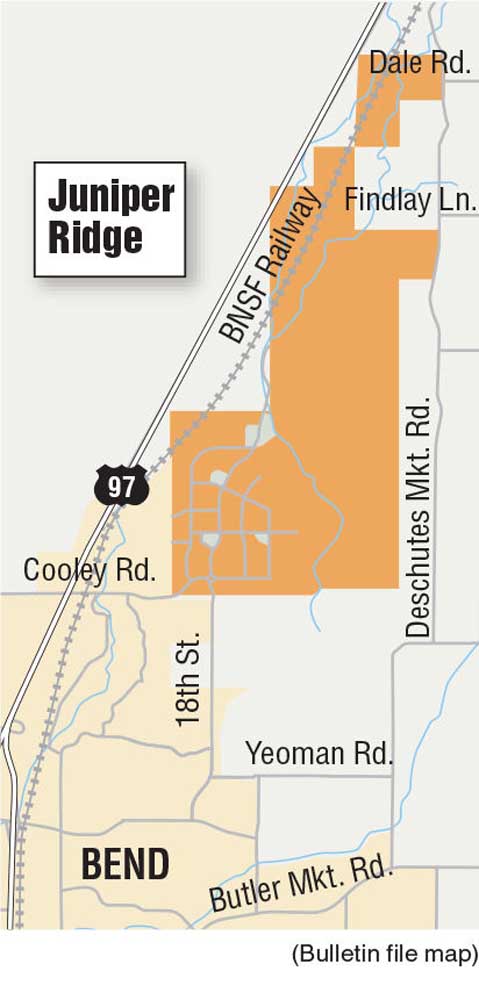Future of Juniper Ridge: a plan for homeless camps and vision for development
Published 12:00 am Wednesday, December 26, 2018

- A map of Juniper Ridge in northeast Bend from 2018.
Bend residents should get a clearer idea of how Juniper Ridge will be developed and what will happen to homeless campers in the area over the next year.
A memo the Bend City Council received last week from Assistant City Manager Jon Skidmore asks councilors to prioritize Juniper Ridge when they begin setting citywide goals for the next two years and give a workgroup of city staff, law enforcement and homeless advocates the OK to develop a plan for how to manage fire risk and transient camps on the 1,500 acres on the northeast edge of Bend.
The 1,500-acre area on the northeast edge of Bend has been owned by the city since 1990, when Deschutes County sold it for $1. About 500 acres are within Bend’s urban growth boundary, or the state-approved line bordering a city that controls where it can grow. The rest of the land is still in the unincorporated county but could be included in future urban growth boundary expansions.
At one point, Bend leaders envisioned Juniper Ridge housing a university, a business park, trails, parks and hundreds of homes, but the 2007-08 recession stifled those plans. Oregon State University-Cascades chose a site in southwest Bend instead, and Juniper Ridge remains largely undeveloped and populated primarily by homeless campers.
City staff estimates there are at least 20 homeless camps in Juniper Ridge. Throughout November and December, city streets crews and inmate crews from the Deschutes County jail removed 132,000 pounds of trash from abandoned camps on the property.
Biannual trash cleanups, plus fire fuels reduction performed through a $25,000 contract with the Heart of Oregon Corps, are expected to continue.
Beyond that, the city could choose to emulate a 2017 Deschutes County land management plan for 2,000 acres east of Redmond that resulted in displacing hundreds of homeless people, some who had camped on the land for years. Or, it could do as some city councilors, including Barb Campbell, would prefer and establish a designated camp with access to sanitary facilities and social services.
“It’s not camps,” Campbell said during a September discussion about Juniper Ridge. “It’s people. These are people who are living out there.”
The City Council also voted 6-1 last week to form a new seven-person committee that will take over most management of Juniper Ridge. Land sales will still be handled by the city’s real estate agent and approved by the City Council, but the new committee is expected to spend the next two years reviewing commitments at Juniper Ridge and developing a new plan for the property.
Councilor Nathan Boddie, who voted against forming the new group, said he didn’t think Bend needed a new vision for Juniper Ridge when the city has a master plan for the area, adopted more than a decade ago.
“For some reason, staff have been reluctant to dust that off and present this as the existing plan for Juniper Ridge,” he said. “There’s been kind of a current toward ‘Let’s just crack this egg open and reinvent Juniper Ridge.’”
Bend’s economic development advisory board, which recommended creating the new committee, expressed interest in following a strategy used in Portland that would establish a loose framework for what the city wants to see in the area — for example, how many new jobs it should create — but leaves private developers to figure out how to build it. The master plan adopted in 2008 details where roads, homes and businesses would go and even includes a man-made lake.
Refining plans for Juniper Ridge doesn’t take away from the work that’s been done, Bend Mayor Casey Roats said.
“I don’t see this as an indictment of documents that may have tried to shape it, but the reality is nothing has changed out there,” he said. “For us as a city to be able to take advantage of that tremendous asset, it simply needs another look.”
The new committee will replace a city board that existed from 2008 to 2014 and focused on land sales and development issues. That board went dormant because there was little private interest in development.
Les Schwab Tire Centers, Suterra Corp. and Pacific Power have facilities in Juniper Ridge and three other companies purchased lots at the site in 2017, but development is slow.
Most of the land needs sewer and water infrastructure and roads before it can be developed. Earlier this year, the Bend City Council approved a $3.2 million contract to start building a major sewer line north of town that will eventually run through Juniper Ridge.
A major state transportation funding package passed in 2017 set aside about $50 million for improvements at Cooley Road and U.S. 97, which will be needed for Juniper Ridge to fully develop. Deschutes County, the City of Bend and the Oregon Department of Transportation have tried to use that money to leverage additional federal funding, and actual roadwork at the intersection is still a long way off.
— Reporter: 541-633-2160; jshumway@bendbulletin.com






